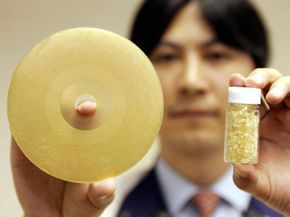Biopolymers and Recycling
As we mentioned earlier, there are other polymers besides plastics. Naturally occurring polymers, such as starches, cellulose, soy protein, vegetable oil, triglycerides and bacterial polyesters, can be extracted from crops and bacteria. Furthermore, plants and microorganisms can produce substances like lactic acid, which can be polymerized into bioplastics (polylactic acid, for example). There are two strategies for producing bioplastics.
Fermentation: Bacteria or other microorganisms mass-produce the biopolymers in bioreactors (fermentation tanks). The biopolymers (lactic acid, polyesters) are extracted from the bioreactors and chemically processed into plastics.
Advertisement
Genetic engineering plants as bioreactors: Biotechnologists introduce bacterial genes into plants. These genes code for the enzymes to make bacterial plastics. The plants are grown and harvested, and the plastics are extracted from the plant material.
In 1997, Cargille Dow made a clear plastic (polylactide) from corn. The polylactide fibers were woven into sports apparel, upholstery fabrics and bioplastic wraps.
Bioplastics have the advantage of being produced from renewable resources (bacteria, plants) rather than nonrenewable resources (oil, natural gas). Furthermore, bioplastics are biodegradable -- they can break down in the environment (see How Landfills Work). Bioplastics is a potentially important industry. With current technology, bioplastics might be more expensive to produce, but biotechnology is rapidly advancing and production may become more economical in the future.
Recycling Plastics
Oil-based plastics don't degrade, but many types (including PP, LDPE, HDPE, PET, and PVC) can be recycled. Each type has a code and identifying number, but some plastics aren't as economically feasible to recycle. So it's important to check with your recycler or municipality about which types of plastics will be accepted.
Once collected, plastics go through the following steps
- Inspection to weed out contaminants and inappropriate types of plastic
- Shredding and washing
- Separation based on density
- Drying
- Melting
- Draining through fine screens to remove more contaminants
- Cooling and shredding into pellets
- Selling back to plastic companies
The discovery of plastics revolutionized our society by introducing a huge variety of lightweight, strong, flexible products with many uses. Although plastics do pose disposal problems, recycling is always a possibility. Furthermore, new research into biopolymers may produce new bioplastic products from renewable resources that are biodegradable and easier on our environment.
To learn more about plastics, check out the links below.
Related HowStuffWorks Articles
More Great Links
Sources
- American Chemistry Council, Plastics 101. http://www.americanchemistry.com/s_plastics/sec_learning.asp?CID=1571&DID=5957
- American Chemistry Council, Hands-On Plastics Science Education Web site. http://www.americanchemistry.com/s_plastics/hands_on_plastics/
- National Geographic Society. "Polymers: They're Everywhere." http://www.americanchemistry.com/s_plastics/Polymers/
- The Vinyl Institute. "Vinyl - the Material." http://vinylinfo.org/materialvinyl/material.html
- Reeko's Mad Scientist Lab, "Making Homemade Plastic." http://www.spartechsoftware.com/reeko/Experiments/ExpMakingPlastic.htm
- Greenemeier, Larry. "Making Plastics Out of Pollution." Scientific American Online. http://www.sciam.com/article.cfm?articleID=1FEC9213-E7F2-99DF-31B07212C78BDACD&chanID=sa003
- Greenemeier, Larry. "Making Plastics as Strong as Steel." Scientific American Online. http://www.sciam.com/article.cfm?chanId=sa003&articleId=8F6AA474-E7F2-99DF-3332C34C30DF9269
- Teaching Tools, "How Are Plastics Made?" http://www.teachingtools.com/Slinky/plastics.html
- American Plastics Council. "Life Cycle of a Plastic Product." http://lifecycle.plasticsresource.com/index.html
- Energy Kid's Page. "Recycling Plastics." http://www.eia.doe.gov/kids/energyfacts/saving/recycling/solidwaste/plastics.html
- Govt. of Canada, BioBasics. "Biopolymers and Bioplastics." http://www.biobasics.gc.ca/english/View.asp?x=790
- University of Cambridge. "Recycling of Plastics." http://www.doitpoms.ac.uk/tlplib/recycling-polymers/printall.php
